The SSD Relapse: Understanding and Choosing the Best SSD
by Anand Lal Shimpi on August 30, 2009 12:00 AM EST- Posted in
- Storage
PCMark Vantage: Used Drive Performance
Immediately after finishing my PCMark Vantage runs on the previous page, I wrote one large file sequentially to the rest of the drive. I then deleted the file, rebooted and re-ran PCMark Vantage. This gives us an idea of the worst case desktop performance of these drives as you create, delete and generally just use these drives.

The biggest difference here is that the Samsung based OCZ Summit drops from 5th to 9th place. All of the drives get slower but the Indilinx drives hardly show it. When it comes to dealing with write speed, SLC flash does have the advantage and we see the X25-E and Vertex EX rise to the top of the pack. The G2 is slightly faster than the G1 and the Indilinx drives follow in close pursuit.
The mechanical drives don't change in performance since they don't get slower with use, only as they get more full.
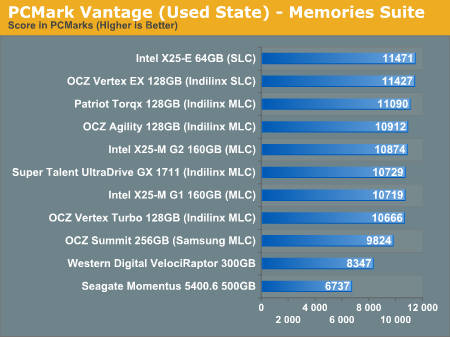
Again we see the two SLC drives at the top, this time followed by a mixture of Indilinx/Intel drives, and the Samsung based Summit is at the bottom of the pack before we get to the HDDs.
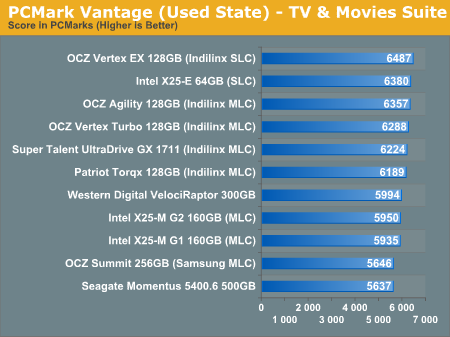
The spread in SSD performance here is only 10% between the slowest non-Samsung drive and the fastest. That tells me that we're mostly CPU bound, but the worst performers other than the Samsung drive are the two Intel X25-Ms. That part tells me that we're at least somewhat bound by sequential write speeds. Either way, the Indilinx drives have a good showing here.
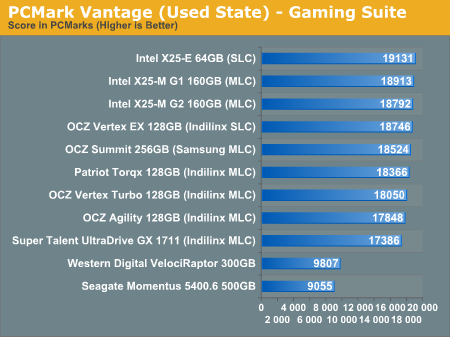
Intel followed by Indilinx SLC with Samsung in league with the MLC Indilinx drives. This is an SSD's dream.
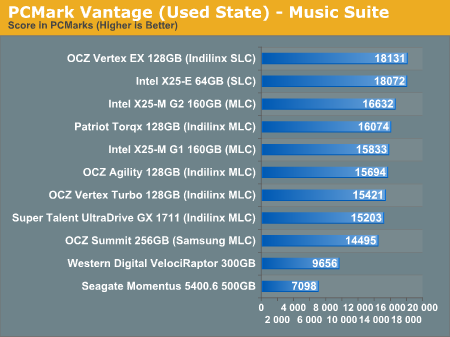
Despite the improvements, the G2 can't touch the much lower write latency of SLC flash here. The Indilinx and Intel G1 drives intermingle while the Samsung drive pulls up the rear. All are faster than a regular hard drive of course.
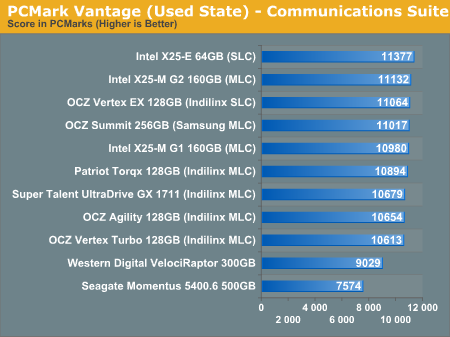
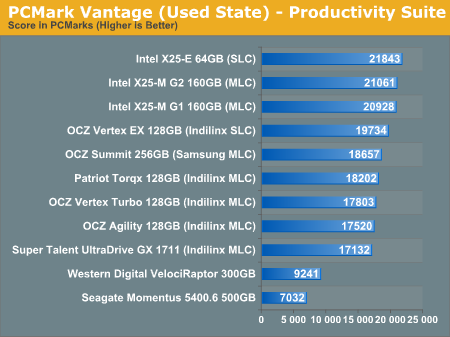
In the multitasking test we once again see Intel rise to the top. The Samsung drive does surprisingly well and the Indilinx drives continue to perform admirably.
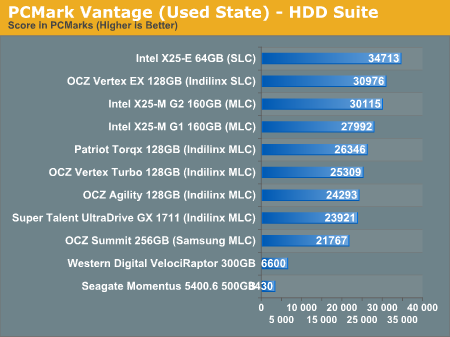
The breakdown between SSDs here is almost linear. The X25-E leads the pack, followed by OCZ's SLC drive. The G2 and G1 are next, then a ton of Indilinx MLC drives. The slowest SSD? The Samsung based Summit of course.










295 Comments
View All Comments
sotoa - Friday, September 4, 2009 - link
Another great article. You making me drool over these SSD's!I can't wait till Win7 comes to my door so I can finally get an SSD for my laptop.
Hopefully prices will drop some more by then and Trim firmware will be available.
lordmetroid - Thursday, September 3, 2009 - link
I use them both because they are damn good and explanatory suffixes. It is 2009, soon 2010 I think we can at least get the suffixes correct, if someone doesn't know what they mean, wikipedia has answers.AnnonymousCoward - Saturday, September 5, 2009 - link
As someone who's particular about using SI and being correct, I think it's better to stick to GB for the sake of simplicity and consistency. The tiny inaccuracy is almost always irrelevant, and as long as all storage products advertise in GB, it wouldn't make sense to speak in terms of GiB.Touche - Thursday, September 3, 2009 - link
Both articles emphasize Intel's performance lead, but, looking at real world tests, the difference between it and Vertex is really small. Not hardly enough to justify the price difference. I feel like the articles are giving an impression that Intel is in a league of its own when in fact it's only marginally faster.smjohns - Tuesday, September 8, 2009 - link
This is where I struggle. It is all very well quoting lots of stats about all these drives but what I really want to know is if I went for Intel over the OCZ Vertex (non-turbo) where would I really notice the difference in performance on a laptop?Would it be slower start up / shut down?
Slower application response times?
Speed at opening large zipped files?
Copying / processing large video files?
If the difference is that slim then I guess it is down to just a personal preference....
morrie - Thursday, September 3, 2009 - link
I've made it a habit of securely deleting files by using "shred" like this: shred -fuvz, and accepting the default number of passes, 25. Looks like this security practice is now out, as the "wear" on the drive would be at least 25x faster, bringing the stated life cycles closer to having an impact on drive longevity. So what's the alternative solution for securely deleting a file? Got to "delete" and forget about security? Or "shred" with a lower number of passes, say 7 or 10, and be sure to purchase a non-Intel drive with the ten year warranty and hope that the company is still in business, and in the hard drive business, should you need warranty service in the outer years...Rasterman - Wednesday, September 16, 2009 - link
watching too much CSI, there is an article somewhere i read by a data repair tech who works in one of the multi-million dollar data recovery labs, basically he said writing over it once is all you should do and even that is overkill 99% of the time. theoretically it is possible to even recover that _sometimes_, but the expense required is so high that unless you are committing a billion dollar fraud or are the secretary to osama bin laden no one will ever try to recover such data. chances are if you are in such circles you can afford a new drive 25x more often. and if you have such information or knowledge wouldn't be far easier and cheaper to simply beat it out of you than trying to recover a deleted drive?iamezza - Friday, September 4, 2009 - link
1 pass should be sufficient for most purposes. Unless you happen to be working on some _extremely_ sensitive/important data.derkurt - Thursday, September 3, 2009 - link
I may be wrong on this, but I'd assume that once TRIM is enabled, a file is securely deleted if it has been deleted on the filesystem level. However, it might depend on the firmware when exactly the drive is going to actually delete the flash blocks which are marked as deletable by TRIM. For performance reasons the drive should do that as soon as possible after a TRIM command, but also preferably at a time when there is not much "action" going on - after all, the whole point of TRIM is to change the time of block erasing flash cells to a point where the drive is idle.
morrie - Thursday, September 3, 2009 - link
That's on a Linux system btwAs to aligning drives...how about an update to the article on what needs to be done/ensured, if anything, for using the drives with a Linux OS?